Generating Leads from Website Content -
The SEO Lead Generation Q&A Guide
Should we invest in Search-Engine-Optimization (SEO) for lead generation?
A question many businesses and startups battle with. SEO is probably one of the most popular, yet seldom understood and mastered marketing channels.
Expectations for getting tons of traffic and SEO leads are high but rarely met.
Apart from getting professional SEO services a lot of business owners and B2B brands start some SEO lead generation efforts along their growth journey, and decide to stop it shortly afterward. We want to address the frequently asked questions and give you clarity on how you can use SEO for lead generation.
Fundamentally, SEO is like building up a muscle, going to the Gym every week, for a long period of time. Unlike, pay-per-click (PPC) marketing, SEO requires thought, strategy, and resources, but the pay-off is also far more rewarding.
According to UppercutSEO.Com SEO lead generation is the process of winning potential customers for products or services by getting website visitors from online search engines such as Google and Bing.
SEO leads definition: What is SEO lead generation?
For B2B brands, SEO lead generation can be a huge opportunity, generating hundreds and thousands of leads on a consistent basis.
Here is what you can expect:
Table of Contents
In this post, we'll answer a number of SEO & lead generation questions. Find the questions you are interested in and click on them in this table below.

Read the entire case study here: AmpliSell
Generating Leads from Website Content -
The SEO Lead Generation Q&A Guide
Should we invest in Search-Engine-Optimization (SEO) for lead generation?
A question many businesses and startups battle with. SEO is probably one of the most popular, yet seldom understood and mastered marketing channels.
Expectations for getting tons of traffic are high but rarely met.
A lot of business owners and B2B brands start some SEO lead generation efforts along their growth journey, and decide to stop it shortly afterward. We want to address the frequently asked questions and give you clarity on how you can use SEO for lead generation.
Fundamentally, SEO is like building up a muscle, going to the Gym every week, for a long period of time. Unlike, pay-per-click (PPC) marketing, SEO requires thought, strategy, and resources, but the pay-off is also far more rewarding.
SEO lead generation is the process of winning potential customers for products or services by getting website visitors from online search engines such as Google and Bing.
SEO leads definition: What is SEO lead generation?
Here is what you can expect:
Table of Contents
1. What are the most important factors to make my content rank in Google?
Quite a few things have changed over the years. SEO has evolved and is an overall quite complex channel to master. Search-Engine-Optimization is the art of creating web content, on a website or blog post and ranking in front of Google's search results.
Google uses a search algorithm that contains hundreds of factors to determine which page and which domain should be favoured and ranked in front for certain search queries. To bring some light into the dark, there is still a few factors that are inarguably more important than others.
The number one factor is quality content. The importance of contact has grown over the last few years. If you don't have content that is, not just high quality or well written, but also addresses the search intent, then it's hard to get your page to rank on page 1. It's important to understand what the searcher is looking for and then to answer that search question as clearly as possible. Forefront Ai may helps you to create more engaging content according to google guidelines
For example, if you have a logo maker website, you can create content related to logo design, trends, and news. This will educate and attract new leads to your website over time. Search engines are like question and answer machines that aim to give the most precise answer that exactly solves all angles of the "problem" or query the searcher is looking for.
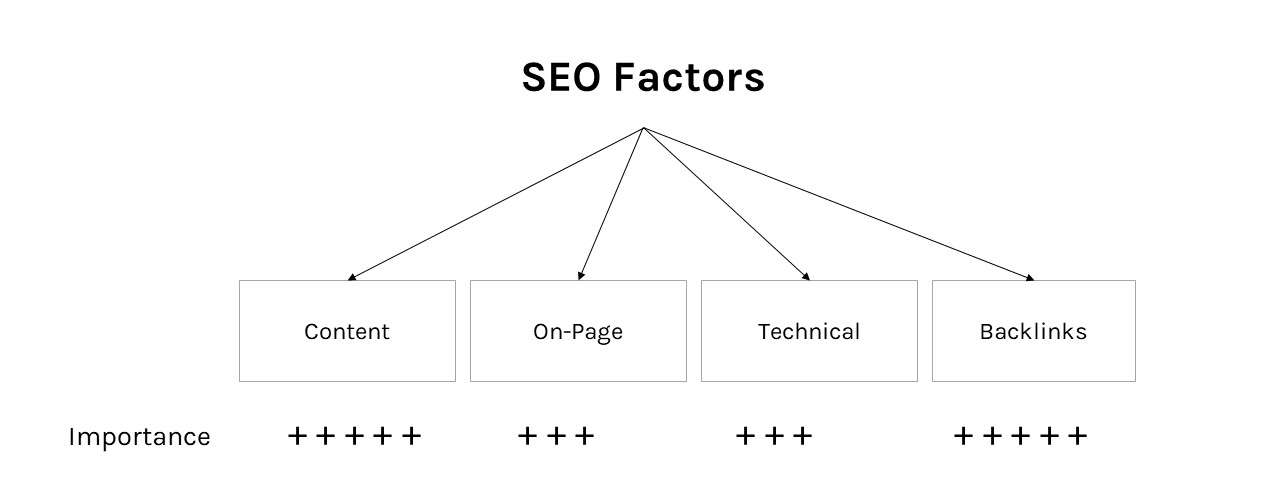
Overview of SEO factors and their importance
Another hugely important ranking factor are backlinks. These are links from pages on other domains on the internet that link to your web-page. Not every link has the same perceived value in the eyes of Google. You should aim to get as many high-quality links as possible so that you are seen as an authority in your industry.
Links are basically a way to measure the credibility & trustworthiness of a page and the domain. High-quality websites that provide a lot of "link-value" are those sites that receive a lot of high-quality links themselves. Think of it as a network of highways that websites receive. The more of these highways reach your site, the better and the more likely Google ranks your content. So apparently it's better to create or buy backlinks on websites like linksmanagement platform to get the best results faster.
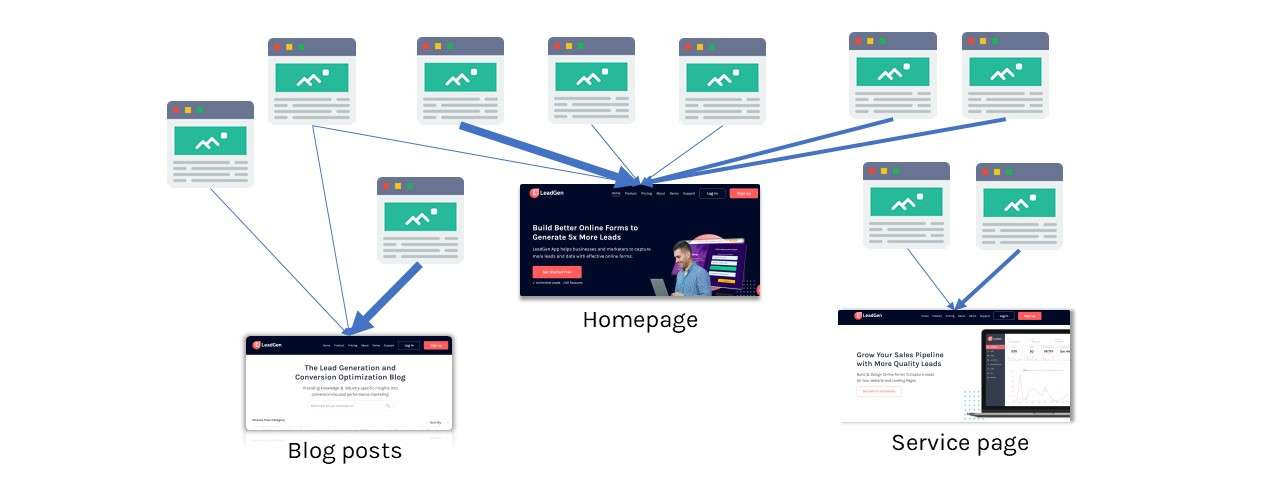
Concept of linkbuilding, showing incoming links from external websites to different pages of the domain. The thickness of the arrows represents the "link-value" your domain receives, depending on the credibility of the site linking to you.
Thirdly, the website on-page experience is a key factor. These are all the factors that measure how users interact with the content on the website, incl. ease of navigation, internal user journeys within your site, bounce rates, exit rates and time spent on page to name a few. Google announced in early 2020 that it will be putting more emphasis on these factors in the short-term future.
Number 4 is the whole technical website set-up. There are dozens, if not hundreds, of technical factors that Google takes into account. These can be little things like page heading tags (h1, h2, h3), image tags, the meta description (the excerpt that shows in Google), Sitemaps, internal links, broken links are much more.
Bonus Tip: Windows-shared hosting can have a positive impact on SEO and lead generation. However, choosing a reliable hosting provider like AccuWeb Hosting with good performance and uptime guarantees is important as optimizing your website for speed, search engine rankings, and user experience to maximize the potential benefits.
Last but not least, page speed is very important to your SEO lead generation. These are all the factors that whether your site is accessible quickly and how fast your content loads up on every device. You should aim for a page speed of fewer than 3 seconds when your site opens. Even outside SEO, page speed is clearly important. You lose about 53% of mobile users if the site takes longer than three seconds to load.
SEO Expert Voices - Jeremy Moser
What are the important SEO factors?
"SEO is very complex, but there are a few factors that drive the most impact. According to Google, that's content and link building. Focus your time and energy on these efforts and outsource more technical and tedious aspects of SEO like on-page optimization, duplicate content pruning, and more."
Jeremy Moser, Co-Founder of uSERP
2. What are the best link-building tactics?
The crux of link-building is understanding that not every link has the same value. A site like Coca-cola.com is a huge site, and one of the biggest brands in the world. On the other hand, take a site of your local plumber.
These are two very different types of websites in terms of "brand equity", how credible businesses are. Google needs to assess which brands are trustworthy and credible and one way it determines this is by using backlinks. Backlinks are links from another domain pointing towards your website. An example of backlinks is what counties in Wisconsin allow tiny houses.
The plumber website is not necessarily untrustworthy. It's just smaller and less established than Coca-Cola and hence receives a much smaller number of incoming links. The trustworthiness of a brand is measured as domain authority or domain rating, depending on where which tool you use to check.
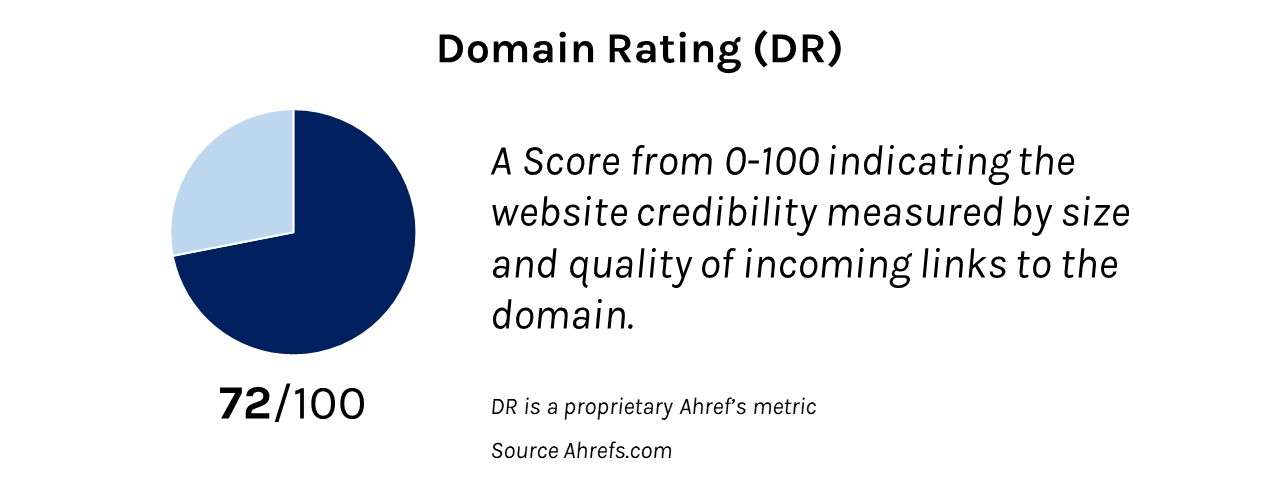
Domain rating definition
If you get backlinks from bigger established sites, then the link has a higher perceived value to Google, giving you a bigger boost to climb in search rankings. Yet, there is more to it. It's not the domain rating, but also about relevancy (match of contents and industry), the specific page characteristics from where you receive the link and more.
Years ago backlinks were typically seen as a positive signal and the domain rating and URL rating (score of the individual page) didn't matter that much. The importance of quality link-building has significantly grown over the last years. It's important to get links that have a match of content relevancy.
Let's say you have an article written on "Search engine optimization". To boost rankings of this article in Google search, you need links from relevant domains and relevant pages. If you get from an article on web design, this won't be considered as relevant as a link from another SEO article on the internet, referencing your post so that you gain a backlink. Link-building needs to be natural and be helpful for the user.
Here is how you find quality links:

Contributing guest content to other sites
Still one of the best ways is guest content, contributing to other sites by creating content. You have to think what is the value you can provide to other websites, rather than thinking about how you can build up as many links as possible. The best way of pitching for guest blog contribution is to think of what's in it for the other side. Here is an example of an outreach email you could use in the initial contact to establish a relationship:
TEMPLATE
Your outreach email should be:
- Professional, yet friendly and relaxed
- Straight to the point
- Personalized
- Valuable
- Mention your call-to-action clearly
Take some time to study the website and person you are reaching out to. Some sites might be open to consider guest content and obviously content itself is a big ranking factor. If you can help another website get a full new article on their site, you can provide good value. They might be willing to work with you and you can establish a relationship and possibly work on more links, content or business partnerships in future. If you feel you are not cut out for this job, you can consider hiring a guest posting service instead.
Unlinked mentions
Another great tactic is called "Unlinked mentions". Just imagine you've made you've done a ton of work over the last years. There's already a lot of stuff on the internet about your brand, yourself and team members. Ensure that those article pieces link back to your site.
You simply do a Google search and type in your brand name or a personal name, related to your company, e.g. yourself as a founder. Then you go through all the listings in Google on web and image search and look onto the sites that featured you. If those sites, don't link back to you, reach out and ask for a reference via a simple link.
Here is a template by Neil Patel that you can use to reach out to those sites:
Subject: Did you make a mistake?
Hey [insert first name],
First off, I just wanted to say thanks for mentioning [insert your domain] in this article [insert a link to the URL that mentions your domain].
I know you are busy so I will just cut to the chase.
Would you mind hotlinking my domain to my website? I know it doesn’t seem like a big deal, but that extra traffic really helps small companies like mine.
Cheers,
[insert your name]
PS: Let me know if I can do anything for you.
Your power base
Last but not least, another one of our favourite tactics is "Work your power base". It's as simple as it sounds. You basically aim to get links from close people you know, including clients, partners, suppliers, your colleague's private websites or side project sites, other relevant sites you own and so on.
If you can't find too many opportunities within your close network, aim to build those relationships from the ground up, e.g. by reaching out to other content creators and website owners in your industry. If you are a local business, it's often easier to start building relationships based on the fact that you are local and people might be more open to working together.
Not so great link-building tactics are:
- Directory site submissions (They have become low quality and often spammy or don't even provide do-follow links)
- Broken links: (Although useful, it takes time finding good opportunities of broken links on other websites that you could potentially replace with your link by reaching out to the webmaster)
- Backlink exchange: A tactic where two brands agree to collaborate and link both ways between each other's site. It can be done, but only on a smaller level to not affect your rankings negatively.
3. What are unusual SEO tactics not many people focus on?
Our Co-Founder Chris on unsual SEO tactics that can help you to rank
SEO is more of an art than a science, yet most people look at it from a singular lense. Although there certainly is a defined number of factors that Google takes into account when ranking a site, there's a lot more to consider when planning out your SEO lead generation strategy. Ranking factors aren't everything and SEO is a lot more complex.
SEO is probably one of the most popular, yet seldom understood and mastered marketing channels.Yet it is one of the most important factors. SEO is a tool that can make a difference between a steady flow of customers and a complete marketing failure. Getting technical SEO consulting is a worthwhile investment for young and established businesses alike."
There is no doubt that content quality, quality links, page experience, site speed and technical factors play a huge role. But, there's more to it and that makes SEO an art rather than a science.
There is dozens of small SEO ranking factors that will only give you marginal gains in rankings. And then is actions you can take that indirectly affect your rankings substantially although these actions were not considered by the search algorithm per se.
One of these "unusual tactics" of SEO lead generation includes Google My Business, a dedicated listing of your company in search results. If you build up a lot of positive reviews on Google my Business, this likely entices more people to click on your website link rather than on clicking through to your competitors. Reviews create momentum on it's own. It leads to higher SEO click-through rate (which is likely a real ranking factor) and getting tons of traffic and website engagement.
This is one example of improving rankings through 2nd level consequences, by thinking through what your activities lead to. You don't need to think about it in complex terms. Just think what's most useful for the user and then invest your time and effort into activities. Building up a Google my business gives your brand a presence and informs users.Other comparable tactics are social media marketing and podcasting. On social media, you build an audience, reviews, grow a fanbase and get attention. All of that leads to other activity which can positively influence your SEO. With podcasting, you can build up a page on your domain that features all your episodes. When promoting your podcast and you deliver great value, people might be willing to share your podcast link which could give you more backlinks (Another crucial SEO factor).
4. SEO vs. PPC: Is SEO worth focusing on if I can get instant results with PPC?
SEO keeps on changing and brands are worried about whether they should invest in this channel. You might wonder if PPC is the right move because it gives you results straight away.
In general, there's always a point in doing SEO because of the scale, opportunity, and longevity.
Let's look at different stages of companies to answer this question. This is the important part because SEO has different potential and use for different stages of companies.
For smaller brands and startups that are just starting out with developing a product, SEO creates a few problems. SEO works with consistency and not a rapid growth acceleration channel. Think of it as a steady steam engine that lets you reach new territory. It's not a rocket engine that gets to the moon and shoots up your results within a week.
And here's the problem. As a self-funded startup, you might not have the product fully developed to understand your positioning. This doesn't suit SEO as a steam engine very well because once it run and gets momentum, it's not to easy to pivot and take a new route. Furthermore, SEO is extremely time, budget and resource-intense.
Even if you got budget and resources, then you might be held accountable by impatient investors who need fast growth. That's simply not compatible.
It's extremely important to follow-through with SEO and give it the attention it needs. Otherwise, it can easily happen that you get disappointed and stop all efforts after just 2,3 months.
PPC marketing helps you figure out if your business model works. If you put 1000 dollars into PPC ads, you straight away see your conversions and engagement with your product or service. Once you got the business model and your unit economics figured out, meaning customer acquisition cost versus lifetime value, then you can think of focusing on SEO.
This stage of companies that are just about to get the business model and numbers figured out, can use SEO to build up another acquisition channel. As mentioned earlier it's essential to focus on with full effort, which includes a blog content marketing strategy, link-building and technical SEO at the minimum.
Looking at another group of business, Established Small and medium-sized brands (SMEs) that exist for more than 5 years: If your business falls in this category, you should definitely do SEO. SMEs often heavily focus on online ads (PPC). That's a good position to build up another growth channel that has longevity and SEO is one of the best options for that. Just like PPC, SEO requires budget. The more you put in, the more you get out.
However, SEO lead generation has a nice side effect, results can last much longer if it's done right. PPC is like a tap you turn on and off, making you dependent on ad platforms. SEO is brand-building for the long-term and for scale, allowing you to reach big international audiences over time.
SEO Expert Voices - Kristina Azarenko
SEO or PPC? "SEO and PPC can definitely work together. PPC can help identify the right keywords that will convert traffic in real leads for your business. And with SEO you can then create content to rank in organic (free) search results on Google. It will help you substantially decrease ad costs in the long run." Kristina Azarenko, SEO Consultant / Founder, MarketingSyrup.What is a Google Algorithm Update?
Thoughts from our Co-founder Chris on the Google 2020 December Core Update
6. How does a change in the page title affect SEO?
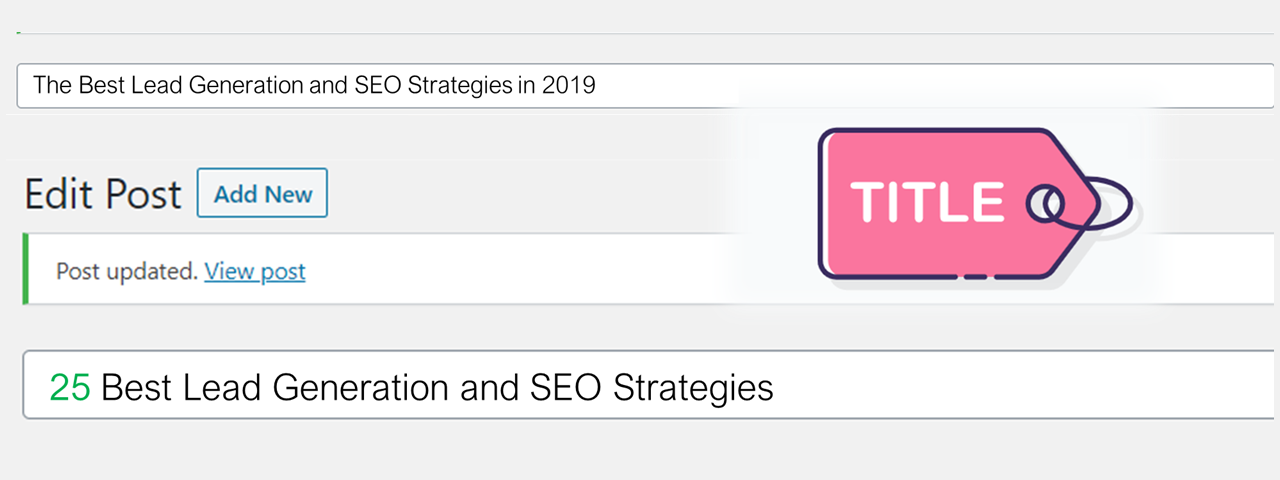
Changing page title for SEO - Good or bad idea?Ideally, pick a title once you publish the content and don’t touch it anymore afterwards. A newspaper or book would not change their titles over and over again but stay with a well-crafted headline that attracts the reader’s interest.
Is a change in page titles a problem? As long as you don’t overstretch it (as in changing the title over and over again, it’s okay to change your page title). Adding keywords to the title might be a good move if you weren’t aware of the keywords when publishing the content. However, make it an exception because you won’t gain a lot of SEO rankings through this tactic.
Rather focus on choosing a great Meta title, the excerpt title that will appear in Google search. This title can be different from your actual page title.
Download SEO Checklist
Step-by-Step Guide to Plan & Execute a Game-Changing SEO Strategy
✓ In-depth and detailed checklist
✓ For companies selling B2B
✓ Covering Complete SEO scope
7. What are page title tags?
The page title tag also called “Meta title tags” are the title of the excerpt that appears in Google’s search results. Making your website rank on the first page is also one part of the SEO game. Once you rank, you need to ensure that your search listing also generates clicks to your site. That's how to generate SEO leads: Start with your content, optimize the search listing for clicks and then optimize the website for conversions. For the purpose of generating clicks, the page title tag is hugely important.
Click-through rate is also a ranking factor in SEO for lead generation: The more clicks you get in search results, the more it tell Google to show your listing over your competitors. Make sure your page title tags are all manually defined using plugins in your content management system like Yoast SEO.
8. What is the main difference between SEO and PPC?
The two channels SEO and PPC (Pay-per-click) marketing are very different in nature. If you are an established business, know your audience and can allocate a bit of marketing budget every month. SEO is an awesome channel, helping you grow a strong brand and generate leads without an ad budget. SEO is far from cheap though, it takes efforts, content production and more.
However, this can be outsourced to an agency or other professional. At the end of the day, the main thing you need with SEO is clarity on your business model and commitment to follow-through with this channel. Without a long-term vision, SEO does not work which is the main reason why it suits established businesses.
For smaller businesses or startups, PPC can be a great channel as it provides instant feedback and results. It's possible to generate leads and sales with PPC without any content, just with a simple web-page. This is the main difference: SEO is super powerful to scale big and build a brand, PPC means spending money for getting leads and sales now.
9. What are the important On-Page SEO factors?
There are hundreds of factors that Google takes into account. A lot these are technical or On-Page factors that matter.
On-page optimization essentially means optimizing a page or post for a group of keywords. The confusing part for SEO marketers, especially for beginners is judging which of these factors to focus on. In general, On-page plays a significant role and has arguably grown in the importance of the years.
Content quality is the No. 1 factor in On-Page SEO. If you don't have great content related to the user's search intent, all the other optimization won't get you far. Important On-Page factors are meta description optimization, defining page structure and H-titles, assigning image attributes, internal links and page experience (how users interact and engage with the content).
10. Which are the best SEO tools?
Great SEO lead generation tools are Ahrefs.com, Semrush.com, Surferseo.com, Moz.com. These are awesome B2B SEO tools for full analytics needs (Site audits, keyword research, competitor analysis, content analysis, tracking and more).
In terms of specialist tools, keyword.com is great for SERP tracking, ubersuggest.com for keyword research (can do a more as well), deadlinkchecker.com for spotting broken links, hikeseo.co to check SEO analytics for startups and small businesses, Yoast SEO as a WordPress plugin for On-Page, Google Analytics for web analytics and Google Search Console for data from the source of Google search clicks and impressions.
11. Which is better: SEO or content marketing?
SEO only works with good content marketing, as in blog or web-page content. Search-Engine-Engine-Optimization is essentially one discipline of content marketing. There are other types of content marketing which can include web content portals, Question-and-Answer sites like Quora.com, social media marketing, podcasting, video, etc.
To assess which type of channel is best for you, ask yourself where your audience spends their time on. Are your customers very active in getting their product information from channels like video, then YouTube bumper ads might be an idea. If your audience actively searches and buys via Google searches, SEO is a very good channel. For example, in specialized sectors like cybersecurity, companies focused on AI-driven cybersecurity solutions have shown that targeted SEO and content marketing can deliver exceptional results. Take some time to figure out the behaviour of your audience to find the best content marketing activity.
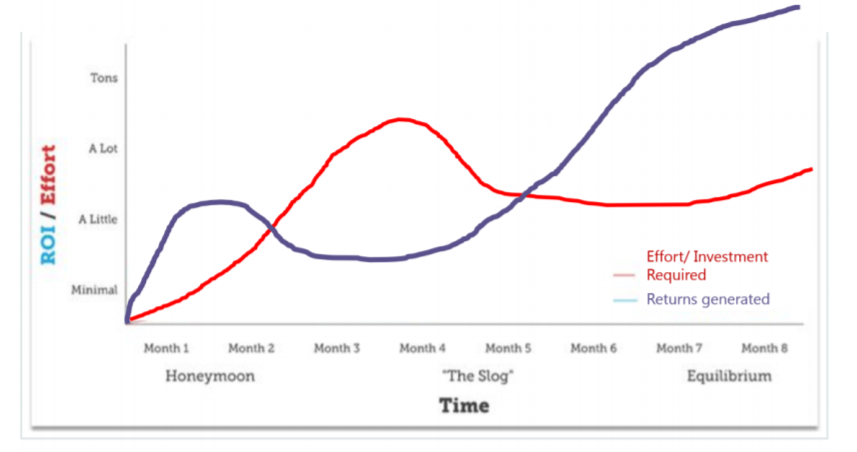
Line charts that compare SEO effort vs return over time: The big payoff of investing into SEO and blog content marketing comes after 6 months
However, before you start make sure you understand that any form of content marketing, including SEO, typically takes time to capitalize. Understand that any content marketing is not suitable for quick wins, rather the long-term perspective and brand-building. Also, it's worth considering your and your team's strengths. Focusing on video and podcast marketing takes a tremendous effort of commitment, SEO is more flexible in this sense and allows you to outsource a lot of the activity.
SEO Expert Voices - Ashish Gupta
SEO or Content Marketing? "Don't just start writing SEO content, start by researching keywords, topic, questions, top-ranking websites, and how you can beat them. Write useful content, implement on-page SEO signals and build backlinks, but always write for your target audience, not for the search engines. Your content marketing efforts should answer user questions and solve their problem cases. This helps in sustaining the rankings on top, reduces bounce rate and helps attaining better conversion rate on the website." Ashish Gupta, SEO Specialist, Airsend
12. What is Off-Page SEO?
Off-page SEO is the process of attaining links from external websites, linking to your domain.
Why is it so important?
Imagine your website like a city that people can only reach via roads. The more roads link to the city, the more popular and credible your city is perceived to be. Google uses links as a key ranking factor to determine the credibility/trustworthiness of your website. Not only does the number of incoming links matter, but also the relevancy (the content from where the links come from), the credibility of the incoming link itself among other factors.
In short, you need a attract a high number of quality links to your web-pages. There are various ways to build links, e.g. via contributing guest content to our sites, sharing testimonials, replacing broken backlinks (reaching out to sites to offer your link to replace their old, broken hyperlinks) and more. If you are want to take off-page SEO seriously, consider hiring the specialists by using a link building agency such as Bulldog Digital, a leading UK-based agency.
13. How to target the right keywords for my site?
Targeting the right keywords is the backbone lead generation SEO. Before you write up any content, make sure you understand the search demand, how many people search for the keyword terms you want to rank for. Also, ensure you fully understand the search intent, what people want to get from the page content after clicking through to your page from Google search.
Traffic quality can be improved by optimizing website content for better keywords with more transactional search intent, meaning people that have a high interest in buying your product or service. Focus your attention on creating content/ web-pages with transactional keywords.
Keep your focus on boosting the ranking of those keywords to the top position in search results via backlink building and monitoring of rankings via Google search console and ranking tracker tools. Be sure to utilize tactics that are specific to your industry, as general SEO practices won’t always cut it. After all, SEO for lawyers will look a lot different than SEO for real estate agents.
The first thing to check is the search volume, how many people search for the keyword term on a monthly basis. You can use keyword research software to find out those stats. Ensure your target keyword that you can overtake in search results, keywords for which the competition is not significantly stronger than you. Demand, search intent and competition are important factors to watch out for when choosing the right keywords.
14. What are the best practices to generate SEO leads for B2B?
SEO is a great channel for lead generation, especially for B2B brands. Once you get targeted search traffic to your page, it's your job to get the user to take an action which is where many SEO marketers stop.
One of the best practices is to add lead magnets (useful content offers) to all your blog posts. Blog visitors that find you find via Google get presented the next suitable offer, e.g. specially crated content resource, whitepaper, online course or anything else. The important point is that you offer those lead magnets throughout your content, e.g. like a banner or directly via a lead form embedded in the post.
Users can only access the content if they share their email address which gives you valuable content details of the lead. Besides blog lead generation, make sure you prominently place your phone number of the header menu of your website if you are B2B service brand. Have a user-friendly contact page as the key lead-generating channel with a multi-step contact form that qualifies your leads and creates a great user experience.
15. How to sell my SEO leads?
Selling SEO leads is a business model where you capture leads via ranking a website in Google. If you want to sell leads, e.g. to financial advisors, then SEO can be a good channel if there is an existing web presence that already ranks.
Getting a site started for the purpose of lead generation is difficult because SEO always has some run-up period before you can get to see results. This model heavily depends on the right niche where companies are willing to pay for leads. This typically includes finance, insurance, consumer services, utilities, and similar industries. Make sure to pick the right niche and you understand SEO well if you want to make a business out of selling leads. Also, consider that search engine lead generation is a longer-term game. Pay-per-click marketing directed to a landing page with an optimized lead form might be a way more effective channel for this model.
16. How can I improve the quality of my SEO leads?
The quality of SEO leads depends on two main factors: The quality of incoming traffic and the set-up of the lead capture form.
Traffic quality can be improved by optimizing website content for better keywords with more transactional search intent, meaning people that have a high interest in buying your product or service. Focus your attention on creating content/ web-pages with transactional keywords. Keep your focus on boosting the ranking of those keywords to the top positions in search results via backlink building and monitoring of rankings via Google Search Console and ranking tracker tools.
Once you get highly targeted traffic on your site, focus on scaling conversions by using a contact form which is easily accessible from the website menu and through internal page links/buttons or banners. Make sure users are direct to this form from the menu, homepage and other pages/posts. Use the lead form to filter out inquiries, by asking qualifying questions about budget, service requirement and company size, starting date, etc. The longer the form, typically the lower the conversion, but the higher the quality of the leads that come through. Use conditional logic to create user journeys via the form that filter out irrelevant leads.
17. How can I automate lead generation using SEO?

Lead generation via SEO is automated when your rankings are so good that you get a consistent amount of traffic. The better your rankings and search clicks, the higher the degree of automation.
Does this mean you can fully automate SEO lead generation?
Yes, you can automate the process of driving SEO traffic and converting this traffic into capture leads via forms on your website potentially funneling them into a SaaS subscription model. However, this SEO traffic needs to be built up first. If you are just starting out, it may take a few months to see this traffic coming in. You can even automate lead follow-up by linking up your captured leads from the web forms into an email marketing or CRM tool. So, it's possible to acquire, collect, and convert B2B leads automatically, but it needs a good amount of initial effort to get there.
18. What is the best Lead Nurturing solution for a mid-sized B2B company with long sales cycles?
Lead nurturing is essentially selling. It's less dependant on the right tool, but the right set of tactics. Instead of searching for the best lead nurturing tool, think about how your ideal customer would need to be convinced to buy from you.
Do your customers convert directly via the website? (in B2B, that's unlikely), do they become a lead first and then need to be contacted via email? (Likely, but is that enough to get a sales?) or do you need to follow-up relentlessly and cleverly via the right channels? (Most likely).
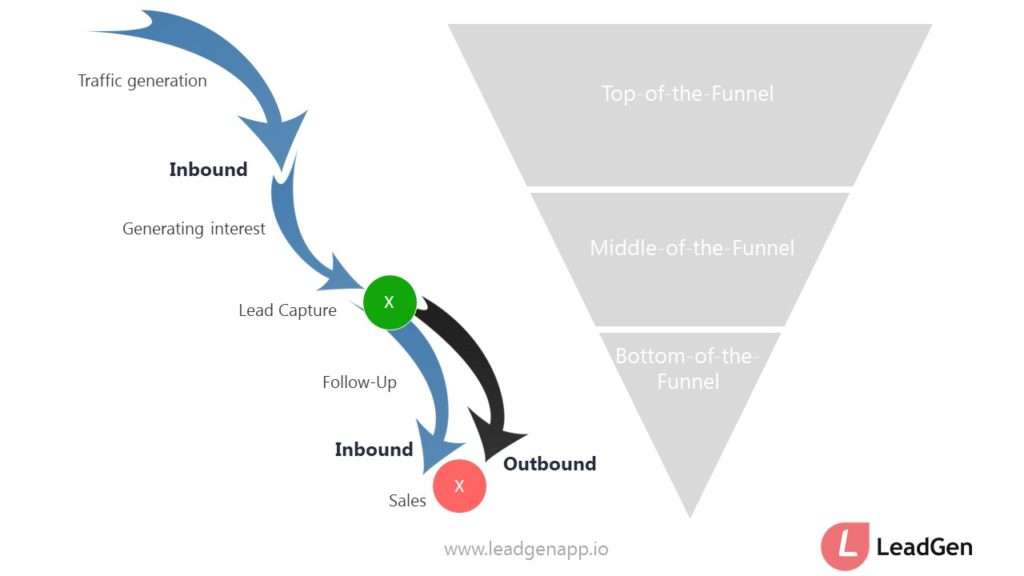
The user journey through a B2B sales funnel via inbound and outbound marketing strategies, capturing the lead and then using follow-up activity to close the sale
80% of B2B leads convert between then 5th and 12th follow-up touch-point. It's a good practice to identify the channels that your audience prefers (call, email, social media, personal follow-up) and then plan and follow-up accordingly. That's' why in follow-up your activity and salesmanship are senior to tools. However, if you are looking for tools, use a solid CRM system which helps you plan and organise the follow-up, like ActiveCampaign, HubSpot, Close.com or Salesforce.
Use LeadGen forms to optimize your lead capture and lead qualification and then pass on the lead data to your CRM system for lead nurture, e.g. via email campaigns. However, one more important thing to add: Speed is everything in a follow-up. You can use LeadGen lead notifications to get informed instantly about your new leads with emails to your inbox.
19. What are the methods to calculate a Lead Score?
Lead scoring is a great practice for planning your sales process, understanding the quality of leads. You can use lead qualification forms which ask the prospect important question that help in assessing the quality of the lead. Include questions about company size, budget, service need, when they have the need, etc. In LeadGen forms, you can assign a numeric value to each choice and then create a formula that calculates a total lead score, e.g. a number from 0-100 or a percentage.
Every lead that submits your contact or lead capture forms will then contain a score which you can see in the lead dashboard and lead notifications. Other methods to calculate lead score is doing manual research, for example by opening the websites of the leads. You can use tools like Ahrefs.com or Moz.com to get a score about the domain authority, highlighting the credibility of the website for search engine.
20. What is a Lead Conversion Funnel?
A lead conversion funnel is a process to acquire contacts that you can sell or market to. A website or landing page can be a key element in a lead conversion funnel, turning traffic into a captured lead. With any funnel, you need traffic channels to achieve conversions. Traffic is simply online users that get introduced to your content or offers. In the context of a lead conversion funnel, you can use any online channel to acquire traffic, incl. SEO, PPC, social media or others.
From the traffic, you either directly capture lead (like Facebook lead forms) or you send the lead to an optimized web-page to provide more context and information to then capture the contact details or even ask for payment details for the lead offer. In short, a lead conversion funnel aims to attract users, for example via content on the web-page, social platforms or ads, provides a clearly defined offer and then capture lead contact information
.
21. What are the Creative Lead Generation Ideas worth trying?
The best creative lead generation tactics are unique and not overly used. Creativity drives on original ideas, so it's best to spend some time brainstorming what type of content your audience may be interested in.
In B2B marketing, "traditional" tactics like website lead capture still work best because companies that have an interest want to find the shortest way to inquire and get information. Creative tactics that might work well in B2B are infographic content, video marketing via social media posts and personalized cold email outreach.
Speaking about email marketing, personalization of emails backed up by research about the prospect can massively help in getting replies. In terms of video, it helps your audience to build a connection with your brand, seeing the people behind it. It's a chance for you to prove your knowledge and share a bit about your culture. After all, people buy from people, so aim to build a personal connection on whatever channel you use. That can be the game-changer in B2B lead generation, whether your tactics are traditional or creative.
22. How can you get more information about the client's interests?
Information about clients' focus of interests plays an important role in promoting the resource. To know how to promote a site, you need to know exactly what to focus on when promoting. This can be done by combining the collection of information with another useful function, such as customer service outsourcing. This can be achieved in different ways, such as with eCommerce customer service outsourcing. The task of the specialist will be to give feedback to everyone who needs it. This can be a consultation, an answer to a question of interest, or coordination on the site. This will not only bring practical benefits - because the client will not be at a loss guessing how to navigate on the site - but will also give you the data that can be included in the statistics needed for further SEO promotion. You can analyze their interests and plan your next actions according to them.
23. What makes a good lead magnet?
A lead magnet is a resource or tool that users can access via opt-in, mostly by filling in their email address. It gives you the chance to capture new leads in exchange for valuable content. The lead magnet should be relevant to the page content it is embedded in. For example, if you have a blog post on debt financing for startups, then provide a lead magnet directly linked to that topic, relevant to the readers.
Nothing is worse than having engaged users on a blog, but then presenting them an irrelevant or a mediocre offer. Secondly, make sure the lead magnet offer gets enough awareness. Use your web pages and blog posts to get your lead magnets seen. Most marketers fail in generating simply because they don't place enough offers and because they are not promoted enough.
Furthermore, provide actionable content, something less academic or formal, but more practical and relevant. Also, don't ask for too much. A downloadable resource or course is easy to access, a consultation or meeting with you requires a lot more commitment. Always have a lower barrier to convert to get the first leads, then increase the ask to get closer to a sale.
24. Which SEO factors are not in your control?
Generally speaking, SEO is not in your control. Google is a privately held company with a lot of freedom to change its algorithm. At any time, rankings can change for or against you. That being said, high quality & consistently updated content is the best protection for staying high in rankings.
The main factors not in your control are reviews being published on Google my Business profiles, links built to your site by third parties. It is fair to say that own your domain and website, so can pretty much change anything you want in terms of website structure, technical set-up and content. This is the property you own and you can make changes to. You are less in control about online profiles, website and the engagement on there which might target your brand and website.
However, keep in mind that overall SEO is a game of constant algorithm changes and updates and it's your job to stay alert and make changes to stay in control, rather than losing it because you are not keeping on top.
SEO Expert Voices - Tom Hunt
Which SEO factors are not in your control? "Success in SEO is a lot like success in life... nothing will happen for the first one or two years of grinding hard night and day. But then, one day... things will start rolling... getting easier and easier and in five years time you dominate :wink: So the learning - just stay in the game!" Tom Hunt, SaaS Marketer.
25. How is SEO changing?
SEO is changing to become more user-centric. Google aims to provide more value to the user and to provide answers in less time. You'll likely go to have more searches being answered in the search results, rather just having listings of websites (featured snippets). This might create the challenge for SEO marketers to see reduced click-through-rates to their sites.
Speaking about web-pages and content, the page experience is going to massively increase in importance. Google aims to understand user behaviour on the page it is sending users to, identifying whether searchers get their answer and the most value.
Furthermore, voice search is expected to keep growing, creating a variety of custom, question-related search terms. Finally, mobile searches will be the norm for a lot of industries, creating the need more fast-loading mobile pages, optimized for SEO.
SEO Expert Voices - Liraz Postan
How to win at SEO? "Grab a user, watch them using your website. Don't help them finding any content or page. User is confused? So does Google. Think about how you can simplify your messaging, navigation, content. Give your users what they are looking for." Liraz Postan, Founder of LP marketing services Inc.
26. What are the best rank tracker tools for SEO?
Great rank tracker tools are Sitechecker, Keyword.com, Accuranker.com, Ranktracker.com, Serpstat.com, Whatsmyserp.com and link-assistant.com. Also, full-service SEO tools like Ahrefs.com, Moz.com and Semrush.com provide rank tracking features. If you are looking for free tools, check out ubersuggest.com from Neil Patel.
27. What is page speed and why does it matter in SEO?
Page speed is an important ranking factor because it massively impacts user experience. It measures the time needed from opening a URL link to seeing the content fully loaded up. If a user can't reach a site because the site opens slowly, then the person will get a negative impression or even leave the site immediately or quicker while browsing through the content.
Studies show that 40% of people abandon a website that takes more than 3 seconds to load. That's a huge amount of users that get lost because of a single factor. Make sure to maximise site performance and page speed to avoid as many drop-offs as possible, on any device (web, tablet, mobile).
SEO Expert Voices - Dan Walker
How to win at SEO? "Search Engine Optimisation goes beyond what is just written on the page. For it to be truly successful, it needs to venture into the technical side as well. Search engines are focused a lot on user experience, and a slow-loading page indicates that users will not have a good experience on your website. In fact, most people will actually leave your website if it takes too long to load, and this increases your bounce rate- another indicator to Google that you shouldn’t be ranked highly. The best way to start improving your page speed is to gather as much data as possible. There are many free tools online that you can use to get started, like GTMetrix and Google’s PageSpeed Insights. Both give you suggestions on how to optimise your website to improve the loading speed. It is also important to know how well your website is performing in this area against others in your industry. Using these free tools you can review the page speed of your competitors’ websites in order to know if you are performing below, on par or even above them!" Answer provided by Dan Walker, Lnet Digital
28. What are the top KPIs you track SEO performance?
There are a number of SEO key-performance indicators (KPI) that matter for achieving results. Firstly, start with tracking Google Search Console to see your search impressions and clicks. Next, use a rank tracker tool to monitor your main keywords (Rankings), For web page analytics, make sure you have Google Analytics set up to see user traffic, new users, acquisition channels, bounce rate and exit rates.
Most importantly, SEO shouldn't stop at measuring rankings and traffic. Also, define conversion goals, e.g. via Google Analytics and track your captured leads via web forms. If you are running an e-commerce site, make sure to measure sales, especially sales generated through organic search traffic. Please check Sonary for more optimization tips.
In short, here is a list of important KPI you should keep checking to grow your SEO:
| Metric (KPI) | Where can I monitor it? | How often should I check it? |
| Search Impressions | Every month | Google Search Console |
| Organic Traffic | Weekly - at least once per month | Google Analytics |
| Rankings | Bi-monthly - at least once per month | Keyword.com, other rank tracking tools |
| Total Traffic (New Users) | Weekly | Google Analytics |
| User acquisition channels | Monthly | Google Analytics, define custom UTM parameters |
| Bounce rate/ Exit Rate | Monthly | Google Analytics |
| Generated Leads/ Sign-ups (Conversions) | Weekly | Google Analytics Events/ Conversion Goals |
| E-Commerce Sales | Weekly - Bi-monthly | Google Analytics, Shopify, various other e-commerce platforms & tracking tools |
29. What are the top KPIs you track SEO performance?
There are a number of SEO key-performance-indicators (KPI) that matter for achieving results. Firstly, start with tracking Google Search Console to see your search impressions and clicks. Next, use a rank tracker tool to monitor your main keywords (Rankings), For web page analytics, make sure you have Google Analytics set-up to see user traffic, new users, acquisition channels, bounce rate and exit rates.
Most importantly, SEO shouldn't stop at measuring rankings and traffic. Also, define conversion goals, e.g. via Google Analytics and track your captured leads via web forms. If you are running an e-commerce site, make sure to measure sales, specially sales-generated through organic search traffic. Please check Sonary for more optimization tips.
In short, here is a list of important KPI you should keep checking to grow your SEO:
| Metric (KPI) | Where can I monitor it? | How often should I check it? |
| Search Impressions | Every month | Google Search Console |
| Organic Traffic | Weekly - at least once per month | Google Analytics |
| Rankings | Bi-monthly - at least once per month | Keyword.com, other rank tracking tools |
| Total Traffic (New Users) | Weekly | Google Analytics |
| User acquisition channels | Monthly | Google Analytics, define custom UTM parameters |
| Bounce rate/ Exit Rate | Monthly | Google Analytics |
| Generated Leads/ Sign-ups (Conversions) | Weekly | Google Analytics Events/ Conversion Goals |
| E-Commerce Sales | Weekly - Bi-monthly | Google Analytics, Shopify, various other e-commerce platforms & tracking tools |
30. How to convert traffic into leads?
The first step to take in converting more traffic into leads is taking the effort of defining goals. Make sure lead conversion is an important goal for your SEO campaigns. That's the first step and crucial because many marketer forget to intentionally focus and measure leads generated via SEO. Secondly, set-up Google Analytics conversion goals, use funnel tracking tools like Databox.com or Mixpanel.
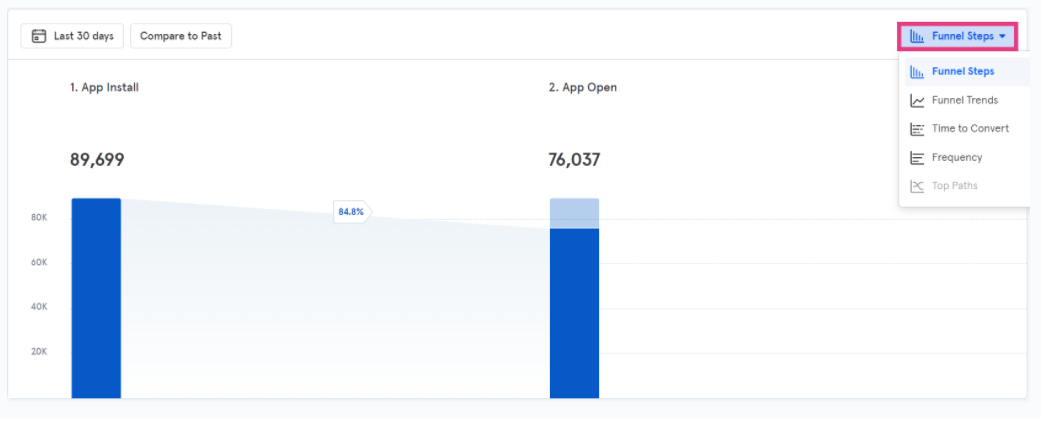 Mixpanel funnel visualization, showing users and conversions between the funnel steps (Source: Mixpanel)
Mixpanel funnel visualization, showing users and conversions between the funnel steps (Source: Mixpanel)
These tools will help you define a conversion, e.g. via a pageview, button click or other criteria.
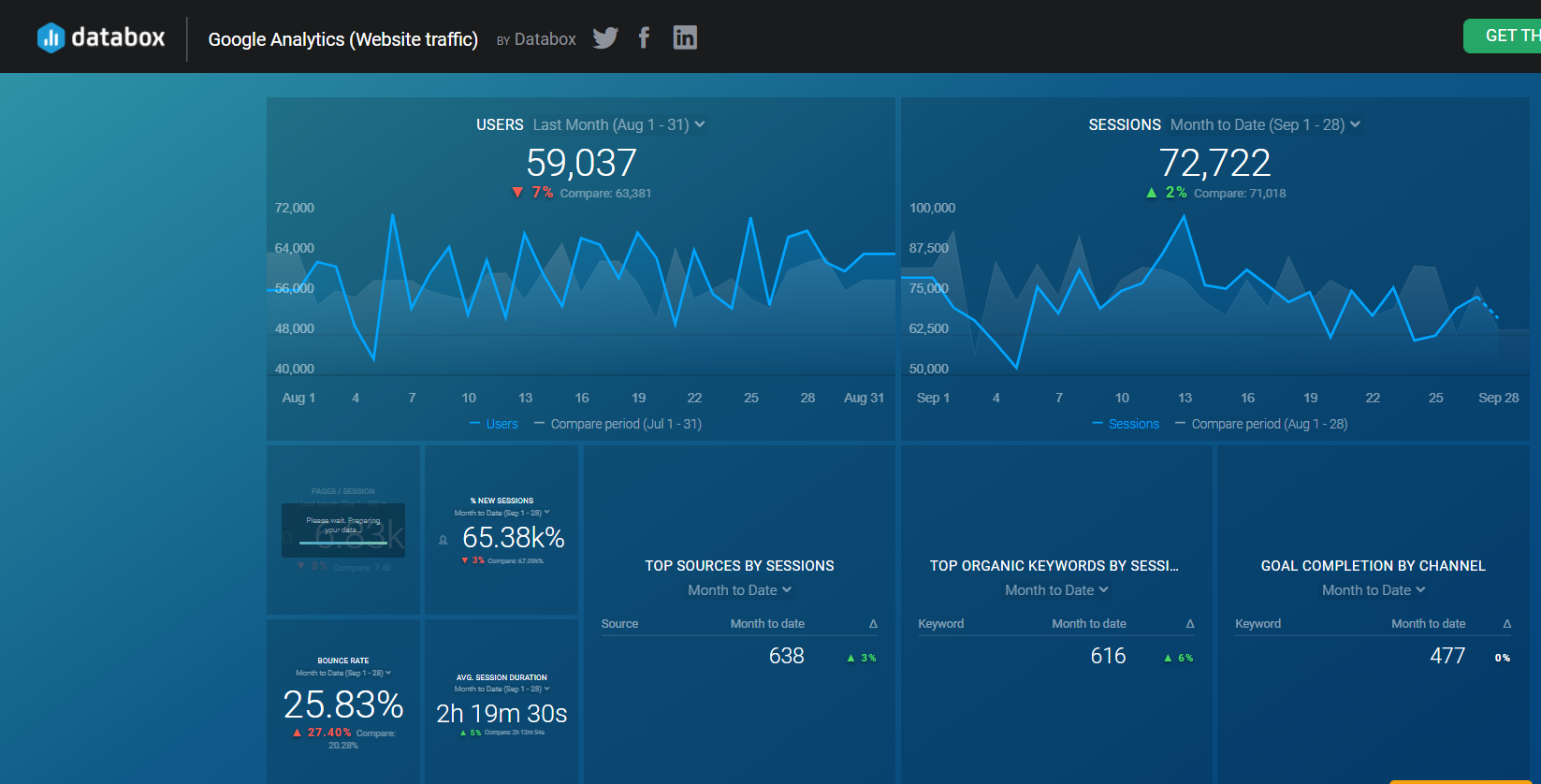
Example of Databox search analytics dashboard, featuring Google Analytics data + Conversion data via goal completions (Source: Databox)
In most cases in lead generation, a conversion is defined as a form completion. You can use LeadGen forms to build high-converting online forms and then define a conversion tracking goal via a Thank-you page users get redirected to after form submission.
Once this is set-up, focus fully on your website user journey and the form in your seo lead generation funnel. Make sure your main lead generation form is easily accessible, e.g. via the header and footer menu and the main contact page.
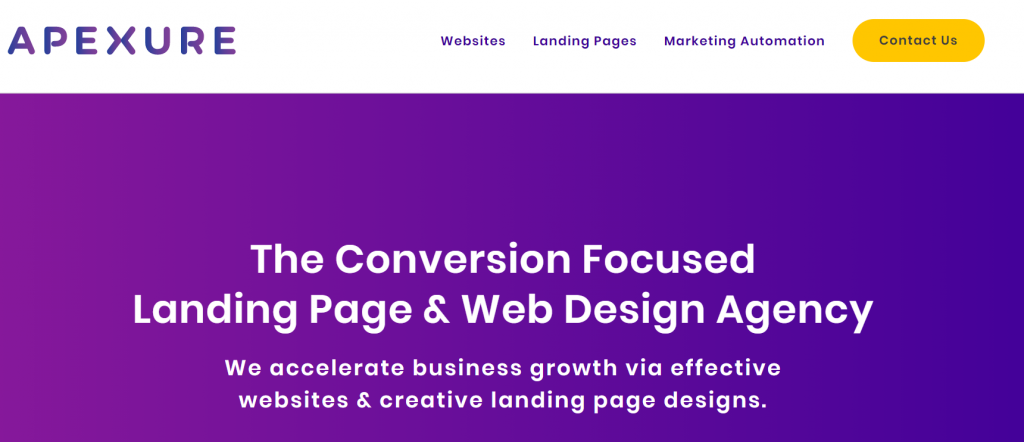 Web agency homepage with a clear, bright CTA button in the header menu (Source: Apexure.com)
Web agency homepage with a clear, bright CTA button in the header menu (Source: Apexure.com)
On the contact page, use a multi-step lead form with a few steps to increase chances for conversions.
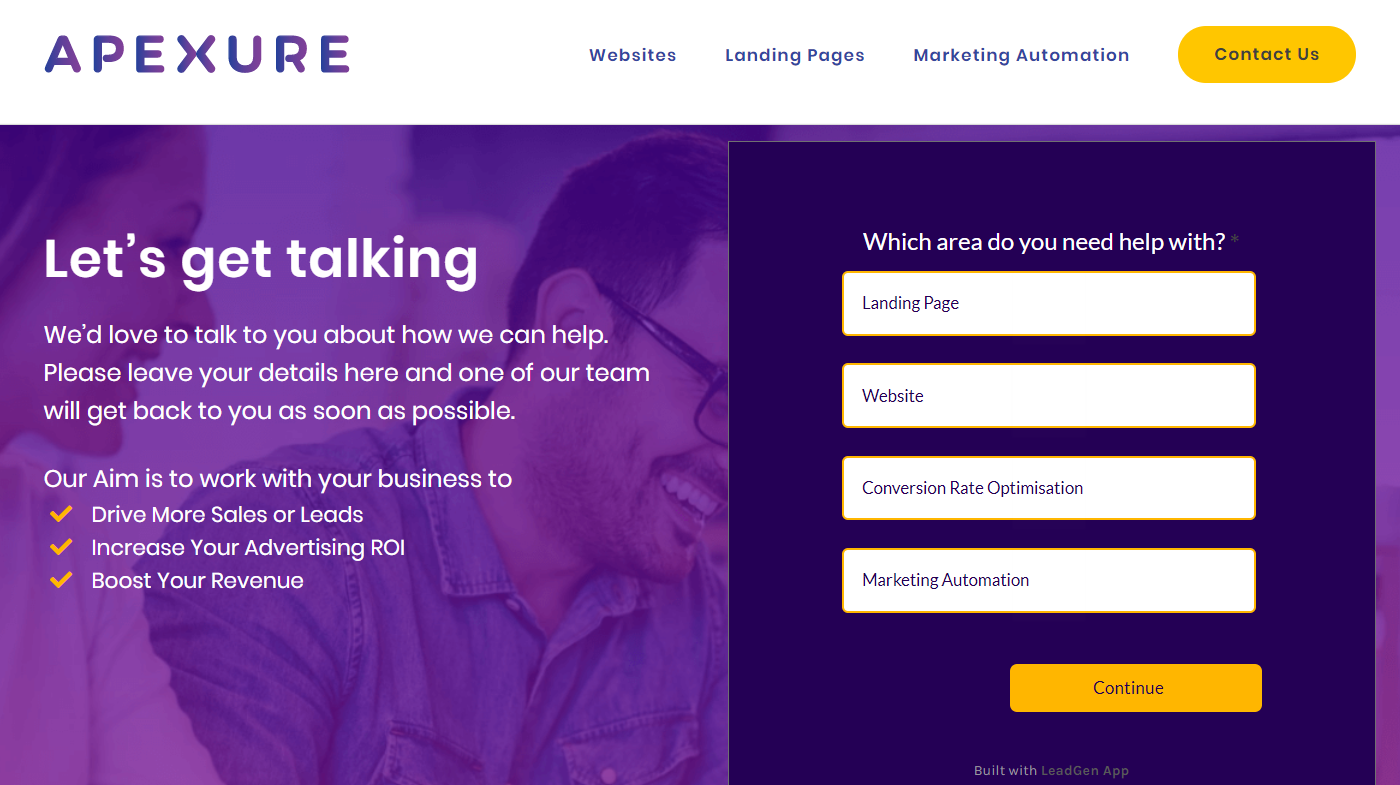 Contact page with B2B lead generation form built with LeadGen App (Source: Apexure.com)
Contact page with B2B lead generation form built with LeadGen App (Source: Apexure.com)
31. What are the little known SEO hacks to increase your search traffic?
SEO is often referred to as more of an art than a science. While SEO is very data-driven and technical, it is also highly intuitive. Changing one factor on your website or lead generation SEO campaign can easily influence a large number of other factors that are relevant for SEO. This means that by thinking intuitively and developing analytical skills, you can create actions which can get you better results.
For example, the meta description (excerpt text that appears in Google) might not be a direct ranking, it can still significantly change your SEO results. Why? Simply because a lot of other factors are dependant on it. By using exceptional copywriting skills for the meta description you can potentially outrank your competition because you get a much higher click-through rate.
Furthermore, matching meta description text to web content is crucial to make sure the user gets exactly what he expects, starting from the search and seeing your meta description text. This is just one example of thinking intuitively and making changes. This way you can grow SEO rankings because you synthesize where your content and website changes lead to. Another great tactic for B2B companies is building up Google my Business reviews to get seen on Google maps and thereby increase engagement and website clicks.
32. How do I get a "do follow" backlink to my website?
"Link-building is an important part of digital marketing. Over the years, the techniques employed by marketers have changed greatly. Let me share with you some techniques on the way to get dofollow backlinks for your blog. The best method is to create something worthy of a link, but surely it’ll take tons of your time, skills, and knowledge.
The next “strategy” that I’d wish to recommend is to make comprehensive, in-depth resources. Creating high-quality content will assist you organically earn links from publishers who appreciate your work. But to urge even more links, you'll also get to reach bent other blogs and websites to assist them to find your content and prefer to link to you. And the last and one among the foremost popular methods that I exploit is guest blogging site. When trying to find places to guest post, your main goal is to seek out sites relevant to your niche or industry.
Google may be an excellent spot to start out within the look for guest posting opportunities. you'll use any of the subsequent keyword searches to seek out blogs that accept guest posts. Just replace ""keywords"" with keywords from your industry.
keyword “submit a guest post”
keyword “guest post”
keyword “write for us”
These searches should lead you to a blog’s guest post guidelines page, guest post submission page, or actual guest posts by other writers.
Answer provided by Arusik Ghambaryan, SEO Specialist
33. How can I implement SEO Schema on web pages?
SEO Schema, as well as Structured Data, is an essential part of SEO. It helps search engines to understand your content. When the user searches any keyword related to your published content, the SERPs display only the relevant websites’ links. To understand whether your website is relevant to the searched keywords or not, the search engines use structured data to check your website content.There are a number of methods to add schema to your website. If your website is built on WordPress, it becomes the easiest of all. This is because WordPress allows you to download plugins to add the schema. So if you are using WordPress, you can effortlessly search for SEO Schema plugins. I personally use Schema & Structured Data for WP & AMP plugin to add/create the schema for my client’s website.
There are also some traditional methods available to add the schema. One of them is adding the schema codes directly to the webpage’s header. You can also use some schema tools to generate the code and use that generated code on your webpage. You can create the schema using TechnicalSEO Schema Generator Tool.
Although, if your website is not built on WordPress, then you’ll have to put the codes one by one on each webpage manually, which can be hectic and time-consuming. But using Schema & Structured Data for WP & AMP plugin, you can save yourself a lot of time. This plugin works efficiently, even on big websites with thousands of webpages.
Answer provided by Jitendar Ahlawat, SEO Specialist.








